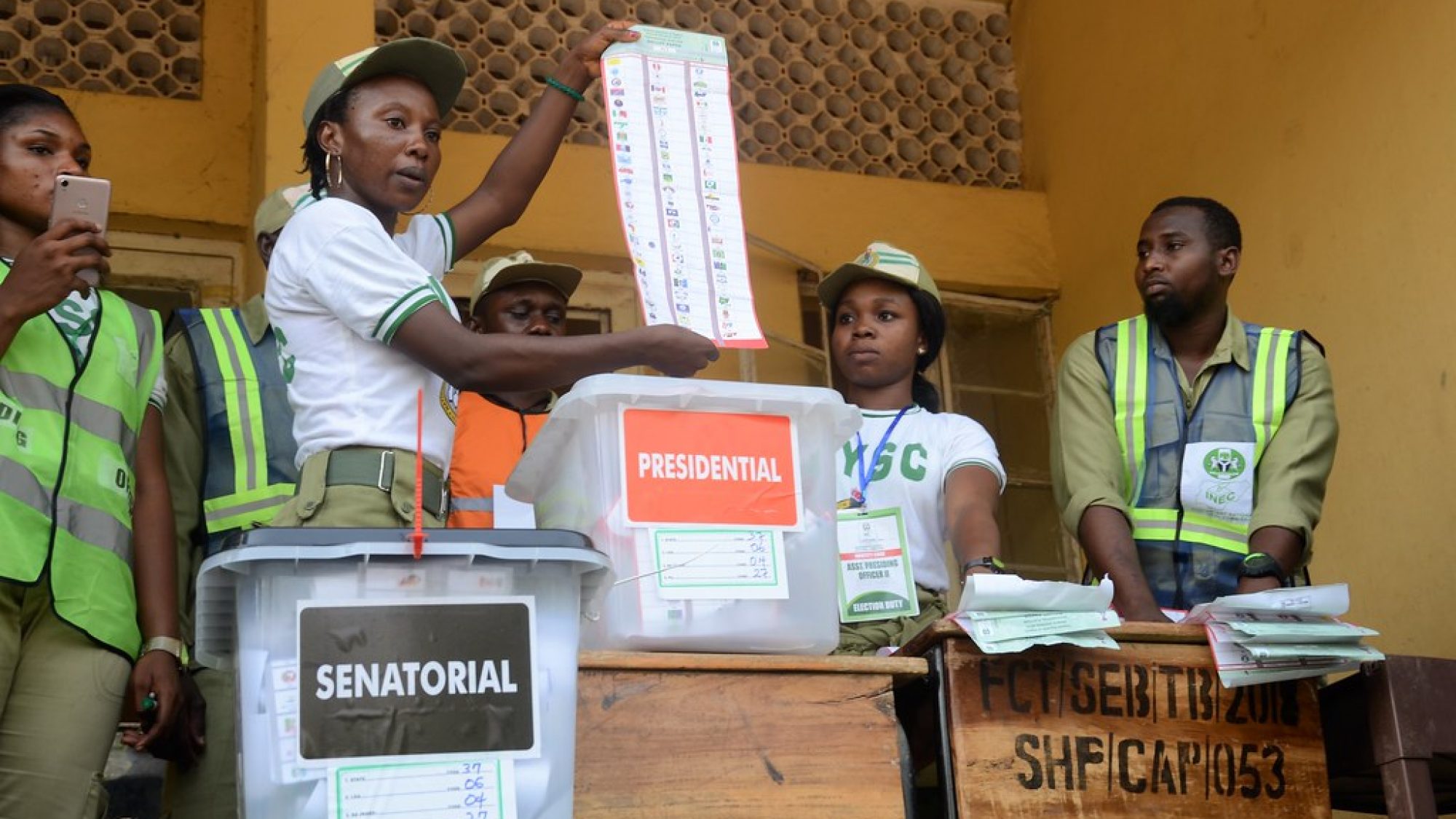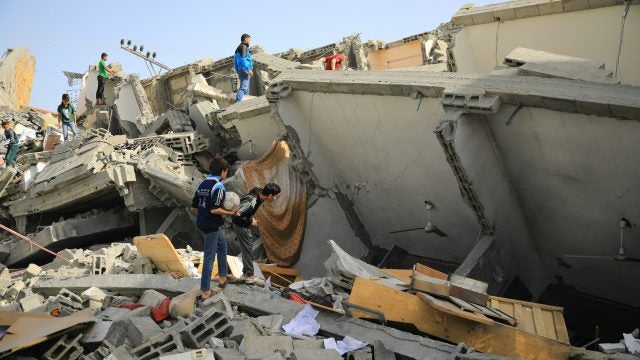
Title: Using Social Media to Improve Nigeria’s Electoral Management
The risk that information can be manipulated on social media to serve political ends or instigate violence should not preclude key election stakeholders in Nigeria from being more active and engaged online. This article argues that the country’s Independent National Electoral Commission should look to develop a more comprehensive and proactive social media strategy and outreach approach ahead of the 2023 general elections that can help improve its interactions with prospective voters and enhance the overall transparency of the process.
Using Social Media to improve Nigeria’s Electoral Management
The last two general elections in Nigeria—2015 and 2019—have seen social media play an increasingly important role. Across the African continent, the proportion of individuals who get their news from digital media at least a few times a week nearly doubled between 2015 and 2020, from twenty-two percent to thirty-eight percent across sixteen countries surveyed by Afrobarometer. Many of these individuals regularly use both the internet (thirty-three percent) and social media (thirty-six percent) as news sources. Although Nigeria did not show a significant change in the proportion of individuals who seek news from digital sources a few times a week, there was an increase in the percentage of Nigerians who checked online sources for news on a daily basis: from seventeen percent to twenty-two percent across the survey’s five-year duration.
Despite the challenge of prevailing misinformation and disinformation on social media platforms, and the way such disinformation can permeate into the media more generally, greater access to online information does not guarantee the creation of more informed citizens. In fact, it often risks entrenching or hardening pre-existing divisions. Ethno-political divisions in Nigeria, accentuated by political actors, have frequently led to violence around polls. In 2011, over eight hundred people died in post-election clashes, whilst over six hundred people were killed across the 2019 electoral cycle according to SBM Intelligence. Off-cycle gubernatorial elections are equally hotly contested and marred by violence.
Self-proclaimed “propaganda secretaries’” increasingly replicate and amplify these dynamics online, working to attack and discredit political opponents through the spread of falsehoods. These individuals, whose affiliation to political parties exists but is often not formalized, have even been involved in efforts to undermine the credibility and independence of Nigeria’s election management body. This misinformation can, in turn, reduce voters’ willingness to accept the declared outcome of an election.
However, the risk that information could be manipulated on social media to serve political ends or instigate violence should not preclude key election stakeholders in Nigeria, such as the Independent National Electoral Commission (INEC), from being more active and engaged across Facebook, Twitter, Instagram, and closed messenger applications like WhatsApp. These key election stakeholders must strategically engage online, and integrate such social media approaches into a wider engagement strategy alongside physical meetings and interaction with traditional media. Such an approach can increase engagement about both the hows and the whys of voting with young and first-time voters, and improve wider perceptions of institutional transparency.
A Pro-active Approach
In the 2019 general election, INEC was a much more visible and active presence online than in previous elections, but its approach to social media was more reactive—dismissing false claims made against it— than proactive. Yet as research into the use of WhatsApp in Nigerian politics has shown, the private messenger application provides ways of engaging in more intimate ways for users. Therefore, as part of its wider engagement strategy, INEC can look to develop a more comprehensive social media strategy and outreach approach, ahead of the 2023 election, and trial it in the off-cycle elections that are scheduled to be held in Ekiti and Osun in 2022.
In fact, INEC could even seek to emulate the organizational structures used by certain political actors. In 2019, both the Buhari New Media Centre (BNMC) and Atikultaed Youth Force (AYF), political groups supportive of leading presidential aspirants, created at least one WhatsApp group for each of the thirty-six states in Nigeria, with each state branch creating groups for each of Nigeria’s 774 local government areas. These were then used to push information and content in support of their candidate. The spread of information outside of these groups was largely organic, but group administrators in the BNMC group for a particular state were in contact with a BNMC executive who provided some degree of overall strategic direction.
Whilst these structures served political goals and were vehicles for misinformation and disinformation, INEC could look to emulate the structures’ use of social media and messaging platforms to educate voters and encourage civic participation ahead of the next election. Declining turnout has been a notable feature of polls since 2003, with just thirty-five percent of Nigerians casting their ballot in the 2019 presidential election. Turnout for state-level races is often even lower, with young people particularly disengaged. But it is not just a lack of interest in politics that drove low turnout in the 2019 election. Fears of political violence also contribute to low voter turnout. On gubernatorial polling day in Kano State in 2019, for example, disinformation that violence was taking place at specific polling stations appeared online and looked to be coordinated in a way designed to target areas with the strongest support for the incumbent governor’s opponent.
Online Credibility
Nigeria’s youth increasingly engage with each other online, as the protests to #EndSARS showed. Discussions on social media can not only improve the quality of information available, but also potentially generate renewed interest in political debate among Nigerians.
INEC should therefore look to find creative and innovative ways to engage this demographic. It will need to carefully identify and partner with civil society organizations, faith-based institutions, and other prominent individuals or groups to create state-level WhatsApp groups. Visually engaging content and audio in local languages tailored to specific state dynamics would further improve INEC’s outreach. This content could focus not only on how to vote, but also could include information about why voting matters and how to report issues or concerns. Individuals in these closed INEC-managed state election groups could then be asked to share this content in their personal networks across the state. Sharing with personal networks could be a powerful tool, as studies in Nigeria have shown that the individual sharing content in Nigeria is often as important as what the content says when people decide whether to trust it. These networks could also be used to feed information back to the INEC at the state and national levels both ahead of the polls and during the casting of ballots, allowing it to respond and adapt quickly to changing situations on the ground.
Countering falsehoods will be a necessary part of this social media strategy, but stakeholders in Nigeria like the INEC can also do much more to improve transparency and trust in the election process by being pro-active in providing regular updates on social media and across other channels to voters, political aspirants, and observers alike.
. . .
Idayat Hassan is director of the Centre for Democracy and Development (CDD), an Abuja-based policy advocacy and research organization with a focus on deepening democracy and development in West Africa. She is a lawyer by training and has been awarded fellowships, including at Columbia University in New York and Yale University. Her interests span democracy, peace and security, transitional justice, and ICT4D across West Africa. She tweets at @hassanidayat.
Image Credit: Commonwealth Secretariat (via Creative Commons)
Recommended Articles

From the 1960s to the 1990s, the Danish government implemented the “Spiral Campaign,” a family planning policy that fitted four thousand and five hundred Inuit women and girls—many underage—with intrauterine…

This piece examines the UK government’s proscription of Palestine Action under the Terrorism Act, situating it within a broader trend of shrinking space for public dissent. It argues that the…

This article analyses the distortions of the International Humanitarian Law (IHL) notion of proportionality in the context of the Israel-Gaza war. It discusses Israel’s attempts to reinterpret proportionality to justify…